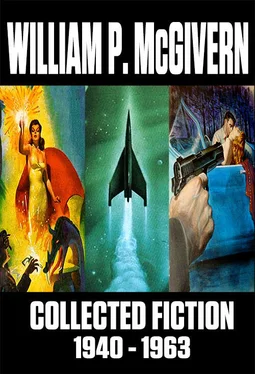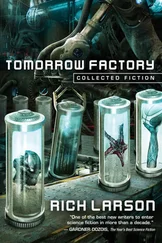Уильям Макгиверн - Collected Fiction - 1940-1963
Здесь есть возможность читать онлайн «Уильям Макгиверн - Collected Fiction - 1940-1963» весь текст электронной книги совершенно бесплатно (целиком полную версию без сокращений). В некоторых случаях можно слушать аудио, скачать через торрент в формате fb2 и присутствует краткое содержание. Год выпуска: 2014, Издательство: Jerry eBooks, Жанр: Ужасы и Мистика, Фантастика и фэнтези, Детектив, Прочие приключения, на английском языке. Описание произведения, (предисловие) а так же отзывы посетителей доступны на портале библиотеки ЛибКат.
- Название:Collected Fiction: 1940-1963
- Автор:
- Издательство:Jerry eBooks
- Жанр:
- Год:2014
- ISBN:нет данных
- Рейтинг книги:3 / 5. Голосов: 1
-
Избранное:Добавить в избранное
- Отзывы:
-
Ваша оценка:
- 60
- 1
- 2
- 3
- 4
- 5
Collected Fiction: 1940-1963: краткое содержание, описание и аннотация
Предлагаем к чтению аннотацию, описание, краткое содержание или предисловие (зависит от того, что написал сам автор книги «Collected Fiction: 1940-1963»). Если вы не нашли необходимую информацию о книге — напишите в комментариях, мы постараемся отыскать её.
Collected Fiction: 1940-1963 — читать онлайн бесплатно полную книгу (весь текст) целиком
Ниже представлен текст книги, разбитый по страницам. Система сохранения места последней прочитанной страницы, позволяет с удобством читать онлайн бесплатно книгу «Collected Fiction: 1940-1963», без необходимости каждый раз заново искать на чём Вы остановились. Поставьте закладку, и сможете в любой момент перейти на страницу, на которой закончили чтение.
Интервал:
Закладка:
In his eyes the turnpike was a fascinating creation, a fabulous artery linking three mighty states, a brilliant complex of traffic rotaries, interchanges and expressways which carried almost a quarter of a million persons safely to their homes and offices each and every day of the year. Consider it, he had urged her, unaware that she was smiling at the clean, boyish line of his profile. This on their fourth date. She was not a regular waitress, but a part-timer filling in on evenings and weekends to help pay for her last year in college. Their fourth date and probably their last, he thought, for he had got on the subject of speeders.
As a logical corollary to O’Leary’s affection for the turnpike was his dislike of those who abused its privileges; and speeders topped this list by a country mile. O’Leary always thought of them as small and shifty-eyed, although the last one he had caught was built like a professional wrestler. They regarded the turnpike as a challenge and troopers as natural enemies. They didn’t have the brains to realize that the checks and safeguards, the radar and unmarked police cars were designed solely for their protection. Instead they acted like sullen, sneaky children, behaving only as long as the parental eye was on them. O’Leary knew their works very well; he had stood dozens of limes at the scene of wrecks, with the moans of the dying in his cars, and seeing the wild patterns of ruptured steel and broken glass, and the nightmarish contortion human bodies could assume after striking a concrete abutment at seventy miles an hour.
He fell strongly about these matters and had tried to make Sheila understand his convictions; but after completing his lecture with an interesting recital of various statistics, he had turned to find her peacefully asleep, with shadows like violets under her eyes and still the faintest trace of a smile on her lips.
Millie had turned to wait on another customer. A woman with two children was trying to catch Sheila’s eye. O’Leary adjusted his cap. Then he said quietly, formally, “I simply wanted you to understand—”
But she didn’t let him finish. “I understand,” she said, smiling up at him. “I couldn’t resist teasing you a little. I’m sorry.” She moved a sugar bowl, and the back of her fingers touched his hand. “It wasn’t very nice of me. I’m afraid.”
“Next Saturday?” he said, smiling with relief and pleasure. “Same time?”
“I’d love to.”
IV
The man who had abandoned the Buick twenty minutes earlier stood in the shadows of the parking lot watching O’Leary and the dark-haired waitress. It was like a movie, he realized with pleasure, the big plate-glass window and the people behind it outlined starkly by the restaurant’s bright lighting. A silent movie, of course. He couldn’t hear what they were saying, but he could see their shifting expressions and the smiles that came and went on their lips.
They weren’t talking business, he thought, and took a deliberate luxurious sip from his container of hot, heavily sweetened coffee. But the big trooper had been very businesslike until the slim, dark-haired girl came along. Talking to the attendant at the gas pumps, then going into the restaurant and quizzing the hostess and the stupid-looking little blonde at the take-out counter. Very serious and efficient. The man watching through the window had seen all that. But now the trooper’s manner had changed.
He and the girl were smiling at each other, trying to be impersonal, of course, masking their feelings; but it was nakedly apparent, disgustingly evident to the man sipping the sweet coffee in the dark parking lot. His name was Harry Bogan, and despite his irritation at their intimate, suggestive smiles, he was still grateful they weren’t talking business. The trooper’s business, that is. For it was from this slender, dark-haired girl that Bogan had bought his coffee and frankfurter. And the trooper hadn’t asked her about it; that was obvious.
Without his overcoat Bogan was cold. But he stood motionless in the shadows until the trooper turned away from the counter after giving the girl a last quick smile and a soft salute. Then Bogan walked the length of the parking lot and moved silently into the opening between two cars. He ate his frankfurter in quick, greedy bites, savoring the tart bite of the mustard on his tongue, and dropped the empty, cradlelike container to the ground. Then he finished the coffee, tilting the cardboard cup high to let a little stream of liquefied sugar trickle into his mouth. He let the cup fall at his feet and drew a deep, satisfied breath. Sugar or honey usually made him feel grateful and at peace with himself.
He watched the doors of the restaurant as he pulled a pair or black-leather gloves over his thick, muscular hands. His eyes were bright with excitement. He shivered with pleasure as he found a crumb of sugar on his lip. His tongue moved dexterously, then flicked the tiny sweetness into his mouth.
Bogan did not have long to wait. Within a matter of seconds a plump, elderly man came hurrying along the line of parked cars, fumbling in his pockets for his keys. Bogan shifted his position slightly, moving into the deeper shadows until only his thick glasses glinted in the darkness, as steady and watchful as the eyes of a crouching cat.
O’Leary returned to his patrol car and reported to headquarters. Sergeant Tonelli said. “Captain Royce wants to talk to you, O’Leary. Hold on.”
The captain’s voice was hard and metallic, as arresting as a pistol shot. “O’Leary, did you get a lead on the man who abandoned that Buick?”
“No, sir. I drew blanks with the gas-pump attendants and the waitresses in the restaurant. He probably wasn’t wearing a hat or overcoat — that’s all I had to go on.”
“Get back to that car. Don’t let anyone near it. Lieutenant Trask and the lab men are on their way. That Buick was used in a double murder in New York not more than an hour ago. Get moving, O’Leary.”
Lt. Andy Trask was short and muscular with shoulders that bulged impressively against his black overcoat.
At forty-five, the lieutenant was a study in somber tones — broad, tanned face, brown eyes and black hair that only in the past year had faded to silver along the temples. As the lab technicians went to work on the car, searching trunk and glove compartments, fingerprinting and photographing, Trask gave O’Leary an account of the information that headquarters had received in a three-state alarm from New York.
“We’ve got no description on the murderer, except that he’s big, and was wearing a light-colored tweed overcoat and a gray hat. Here’s what he did: Around six-thirty this evening he walked into a little furniture-repair-type shop on Third Avenue in Manhattan and shot and killed the owners, a young married couple named Swanson. It wasn’t a robbery: he just shot ‘em and ran out The Buick belongs to a druggist who’d parked it about a half block from the furniture shop, with the keys in the ignition. The killer was seen running from the shop by an old woman in an apartment across the street; but she’s an invalid with no phone.
“It took her half an hour to get hold of her landlady. The landlady, like everybody else in the neighborhood, was down in the street talking about what had happened. So — half an hour later — the invalid tells her story. She described the clothes the guy was wearing and the license number of the Buick. But by that time the murderer had got through the Lincoln Tunnel and onto our pike.” Trask turned and jerked his thumb at the Buick. “Now he’s ditched this crate and more than likely is looking for another one. We’ve got to find him before somebody else gets hurt.”
“With no description,” O’Leary said slowly. “He’s got rid of the tweed coat and gray hat. We’ve got nothing to go on. He could be off and running by now in another car.” He glanced helplessly at the streams of traffic rolling smoothly past him. “Any car, lieutenant. With a gun he could force his way into a station wagonful of college kids. Or climb in with a nice little family group where he’d look like innocent Old Uncle Fred. He could be in a truck, or in a trailer, holding a gun against some woman’s head while her husband drives him off the pike. It’s like chasing ghosts blindfolded.”
Читать дальшеИнтервал:
Закладка:
Похожие книги на «Collected Fiction: 1940-1963»
Представляем Вашему вниманию похожие книги на «Collected Fiction: 1940-1963» списком для выбора. Мы отобрали схожую по названию и смыслу литературу в надежде предоставить читателям больше вариантов отыскать новые, интересные, ещё непрочитанные произведения.
Обсуждение, отзывы о книге «Collected Fiction: 1940-1963» и просто собственные мнения читателей. Оставьте ваши комментарии, напишите, что Вы думаете о произведении, его смысле или главных героях. Укажите что конкретно понравилось, а что нет, и почему Вы так считаете.

![Уильям Макгиверн - Завтра опять неизвестность [английский и русский параллельные тексты]](/books/35168/uilyam-makgivern-zavtra-opyat-neizvestnost-angli-thumb.webp)









